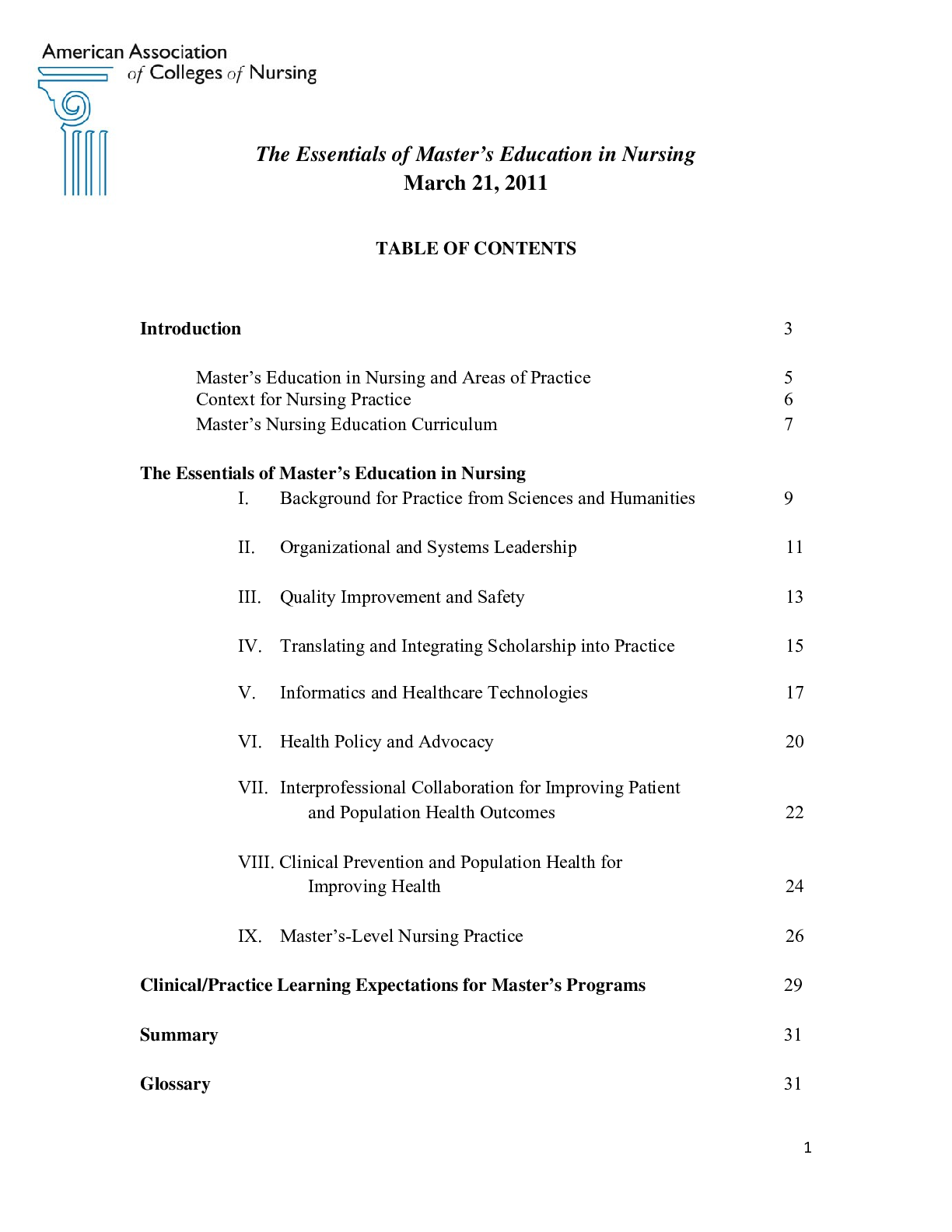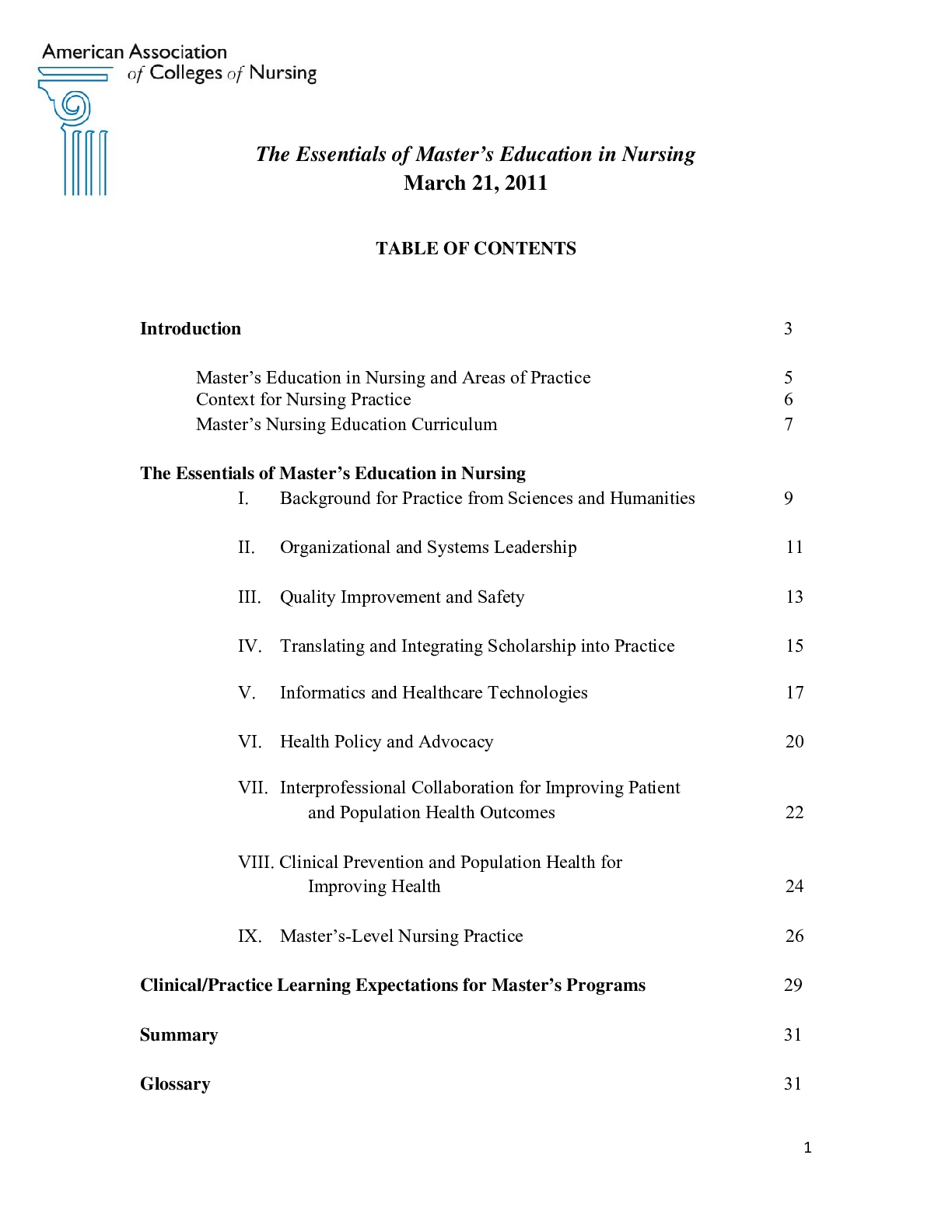The Essentials of Master’s Education in Nursing
March 21, 2011
The Essentials of Master’s Education in Nursing reflect the profession’s continuing call for
imagination, transformative thinking, and evolutionary change in graduate education. The
extraordinary explosion of knowledge, expanding technologies, increasing diversity, and global
health challenges produce a dynamic environment for nursing and amplify nursing’s critical
contributions to health care. Master’s education prepares nurses for flexible leadership and
critical action within complex, changing systems, including health, educational, and
organizational systems. Master’s education equips nurses with valuable knowledge and skills to
lead change, promote health, and elevate care in various roles and settings. Synergy with these
Essentials, current and future healthcare reform legislation, and the action-oriented
recommendations of the Initiative on the Future of Nursing (IOM, 2010) highlights the value and
transforming potential of the nursing profession.
These Essentials are core for all master’s programs in nursing and provide the necessary
curricular elements and framework, regardless of focus, major, or intended practice setting. These
Essentials delineate the outcomes expected of all graduates of master’s nursing programs. These
Essentials are not prescriptive directives on the design of programs. Consistent with the
Baccalaureate and Doctorate of Nursing Practice Essentials, this document does not address
preparation for specific roles, which may change and emerge over time. These Essentials also
provide guidance for master’s programs during a time when preparation for specialty advanced
nursing practice is transitioning to the doctoral level.
Master’s education remains a critical component of the nursing education trajectory to prepare
nurses who can address the gaps resulting from growing healthcare needs. Nurses who obtain the
competencies outlined in these Essentials have significant value for current and emerging roles in
healthcare delivery and design through advanced nursing knowledge and higher level leadership
skills for improving health outcomes. For some nurses, master’s education equips them with a
fulfilling lifetime expression of their mastery area. For others, this core is a graduate foundation
for doctoral education. Each preparation is valued.
Introduction
The dynamic nature of the healthcare delivery system underscores the need for the
nursing profession to look to the future and anticipate the healthcare needs for which
nurses must be prepared to address. The complexities of health and nursing care today
make expanded nursing knowledge a necessity in contemporary care settings. The
transformation of health care and nursing practice requires a new conceptualization of
master’s education. Master’s education must prepare the graduate to:
• Lead change to improve quality outcomes,
4 • Advance a culture of excellence through lifelong learning,
• Build and lead collaborative interprofessional care teams,
• Navigate and integrate care services across the healthcare system,
• Design innovative nursing practices, and
• Translate evidence into practice.
Graduates of master’s degree programs in nursing are prepared with broad knowledge
and practice expertise that builds and expands on baccalaureate or entry-level nursing
practice. This preparation provides graduates with a fuller understanding of the discipline
of nursing in order to engage in higher level practice and leadership in a variety of
settings and commit to lifelong learning. For those nurses seeking a terminal degree, the
highest level of preparation within the discipline, the new conceptualization for master’s
education will allow for seamless movement into a research or practice-focused doctoral
program (AACN, 2006, 2010).
The nine Essentials addressed in this document delineate the knowledge and skills that all
nurses prepared in master’s nursing programs acquire. These Essentials guide the
preparation of graduates for diverse areas of practice in any healthcare setting.
Read More


